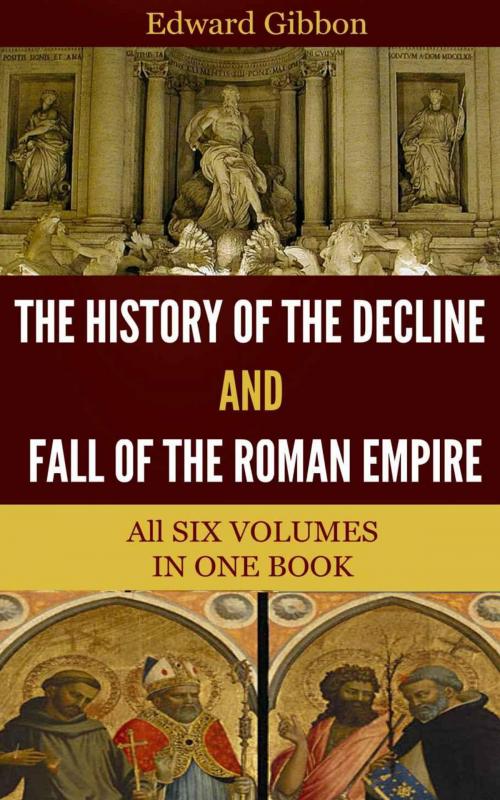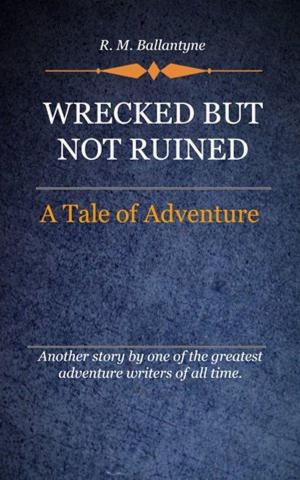The History of the Decline and Fall of the Roman Empire
Nonfiction, History, Italy, Religion & Spirituality, Christianity, Church, Church History, Ancient History, Rome| Author: | Gibbon, Edward | ISBN: | 1230000309813 |
| Publisher: | Delmarva Publications, Inc. | Publication: | March 9, 2015 |
| Imprint: | Language: | English |
| Author: | Gibbon, Edward |
| ISBN: | 1230000309813 |
| Publisher: | Delmarva Publications, Inc. |
| Publication: | March 9, 2015 |
| Imprint: | |
| Language: | English |
All six volumes are contained in this eBook. There is a linked table of contents, and the footnotes are also linked.
Gibbon’s masterpiece, which narrates the history of the Roman Empire from the second century A.D. to its collapse in the west in the fifth century and in the east in the fifteenth century, is widely considered the greatest work of history ever written.
The History of the Decline and Fall of the Roman Empire (sometimes shortened to Decline and Fall of the Roman Empire) is a book of history written by the English historian Edward Gibbon, which traces the trajectory of Western civilization (as well as the Islamic and Mongolian conquests) from the height of the Roman Empire to the fall of Byzantium. Published in six volumes, volume I was published in 1776 and went through six printings. Volumes II and III were published in 1781; Volumes IV, V, and VI in 1788–89. The original volumes were published in quarto sections, a common publishing practice of the time. The work covers the history of the Roman Empire, Europe, and the Catholic Church from 98 to 1590 and discusses the decline of the Roman Empire in the East and West. Because of its relative objectivity and heavy use of primary sources, at the time its methodology became a model for later historians. This led to Gibbon being called the first "modern historian of ancient Rome".
Gibbon offers an explanation for why the Roman Empire fell, a task made difficult by a lack of comprehensive written sources, though he was not the only historian to tackle the subject. According to Gibbon, the Roman Empire succumbed to barbarian invasions in large part due to the gradual loss of civic virtue among its citizens. They had become weak, outsourcing their duties to defend their Empire to barbarian mercenaries, who then became so numerous and ingrained that they were able to take over the Empire. Romans, he believed, had become effeminate, unwilling to live a tougher, "manly" military lifestyle. In addition, Gibbon argued that Christianity created a belief that a better life existed after death, which fostered an indifference to the present among Roman citizens, thus sapping their desire to sacrifice for the Empire. He also believed its comparative pacifism tended to hamper the traditional Roman martial spirit. Finally, like other Enlightenment thinkers, Gibbon held in contempt the Middle Ages as a priest-ridden, superstitious dark age. It was not until his own age of reason and rational thought, it was believed, that human history could resume its progress.
Gibbon saw the Praetorian Guard as the primary catalyst of the empire's initial decay and eventual collapse, a seed planted by Augustus at the establishment of the empire. He cites repeated examples of the Praetorian Guard abusing their power with calamitous results, including numerous instances of imperial assassination and incessant demands for increased pay.
Gibbon's style is frequently distinguished by an ironically detached and somewhat dispassionate yet critical tone. He occasionally lapsed into moralization and aphorism.
"As long as mankind shall continue to bestow more liberal applause on their destroyers than on their benefactors, the thirst of military glory will ever be the vice of the most exalted characters".
"The influence of the clergy, in an age of superstition, might be usefully employed to assert the rights of mankind; but so intimate is the connection between the throne and the altar, that the banner of the church has very seldom been seen on the side of the people"(Chapter Three).
"History...is, indeed, little more than the register of the crimes, follies, and misfortune of mankind"(ibid).
"If we contrast the rapid progress of this mischievous discovery [of gunpowder] with the slow and laborious advances of reason, science, and the arts of peace, a philosopher, according to his temper, will laugh or weep at the folly of mankind" (Chapter).
All six volumes are contained in this eBook. There is a linked table of contents, and the footnotes are also linked.
Gibbon’s masterpiece, which narrates the history of the Roman Empire from the second century A.D. to its collapse in the west in the fifth century and in the east in the fifteenth century, is widely considered the greatest work of history ever written.
The History of the Decline and Fall of the Roman Empire (sometimes shortened to Decline and Fall of the Roman Empire) is a book of history written by the English historian Edward Gibbon, which traces the trajectory of Western civilization (as well as the Islamic and Mongolian conquests) from the height of the Roman Empire to the fall of Byzantium. Published in six volumes, volume I was published in 1776 and went through six printings. Volumes II and III were published in 1781; Volumes IV, V, and VI in 1788–89. The original volumes were published in quarto sections, a common publishing practice of the time. The work covers the history of the Roman Empire, Europe, and the Catholic Church from 98 to 1590 and discusses the decline of the Roman Empire in the East and West. Because of its relative objectivity and heavy use of primary sources, at the time its methodology became a model for later historians. This led to Gibbon being called the first "modern historian of ancient Rome".
Gibbon offers an explanation for why the Roman Empire fell, a task made difficult by a lack of comprehensive written sources, though he was not the only historian to tackle the subject. According to Gibbon, the Roman Empire succumbed to barbarian invasions in large part due to the gradual loss of civic virtue among its citizens. They had become weak, outsourcing their duties to defend their Empire to barbarian mercenaries, who then became so numerous and ingrained that they were able to take over the Empire. Romans, he believed, had become effeminate, unwilling to live a tougher, "manly" military lifestyle. In addition, Gibbon argued that Christianity created a belief that a better life existed after death, which fostered an indifference to the present among Roman citizens, thus sapping their desire to sacrifice for the Empire. He also believed its comparative pacifism tended to hamper the traditional Roman martial spirit. Finally, like other Enlightenment thinkers, Gibbon held in contempt the Middle Ages as a priest-ridden, superstitious dark age. It was not until his own age of reason and rational thought, it was believed, that human history could resume its progress.
Gibbon saw the Praetorian Guard as the primary catalyst of the empire's initial decay and eventual collapse, a seed planted by Augustus at the establishment of the empire. He cites repeated examples of the Praetorian Guard abusing their power with calamitous results, including numerous instances of imperial assassination and incessant demands for increased pay.
Gibbon's style is frequently distinguished by an ironically detached and somewhat dispassionate yet critical tone. He occasionally lapsed into moralization and aphorism.
"As long as mankind shall continue to bestow more liberal applause on their destroyers than on their benefactors, the thirst of military glory will ever be the vice of the most exalted characters".
"The influence of the clergy, in an age of superstition, might be usefully employed to assert the rights of mankind; but so intimate is the connection between the throne and the altar, that the banner of the church has very seldom been seen on the side of the people"(Chapter Three).
"History...is, indeed, little more than the register of the crimes, follies, and misfortune of mankind"(ibid).
"If we contrast the rapid progress of this mischievous discovery [of gunpowder] with the slow and laborious advances of reason, science, and the arts of peace, a philosopher, according to his temper, will laugh or weep at the folly of mankind" (Chapter).















